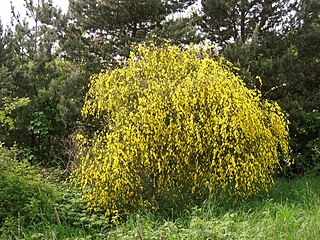
A shrub is a small-to-medium-sized perennial woody plant. Unlike herbaceous plants, shrubs have persistent woody stems above the ground. Shrubs can be either deciduous or evergreen. They are distinguished from trees by their multiple stems and shorter height, less than 6–10 m (20–33 ft) tall. Small shrubs, less than 2 m (6.6 ft) tall are sometimes termed as subshrubs. Many botanical groups have species that are shrubs, and others that are trees and herbaceous plants instead.

An arboretum is a botanical collection composed exclusively of trees of a variety of species. Originally mostly created as a section in a larger garden or park for specimens of mostly non-local species, many modern arboreta are in botanical gardens as living collections of woody plants and is intended at least in part for scientific study.

The San Francisco Botanical Garden at Strybing Arboretum is located in San Francisco's Golden Gate Park. Its 55 acres represents nearly 9,000 different kinds of plants from around the world, with particular focus on Magnolia species, high elevation palms, conifers, and cloud forest species from Central America, South America and Southeast Asia.

The Oklahoma City Zoo and Botanical Garden is a zoo and botanical garden located in Oklahoma City's Adventure District in northeast Oklahoma City, Oklahoma.

The San Luis Obispo Botanical Garden is a botanical garden located in the rolling hills of El Chorro Regional Park, between San Luis Obispo and Morro Bay in San Luis Obispo County, within the Central Coast of California region. Its grounds, when completed, will be a 150-acre (61 ha) collection of gardens displaying the diverse plant life of the five Mediterranean climate zones of the world; the Mediterranean Basin, and regions of California, Chile, Australia, and South Africa.
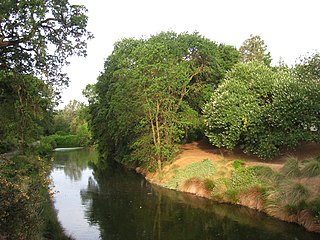
The University of California, Davis Arboretum is an approximately 100-acre (0.40 km2) arboretum along the banks of the old north channel of Putah Creek on the south side of the University of California, Davis campus in unincorporated Yolo County, California, in the United States.

The Arboretum & Botanic Garden at the University of California, Santa Cruz, is located on the campus of the University of California, Santa Cruz, in the United States.

Turtle Bay Exploration Park, located in Redding, California, is a non-profit 300-acre gathering place featuring the Sundial Bridge, a museum, forestry and wildlife center, arboretum and botanical gardens. The park is located at gateway to the Sacramento River Trails, Turtle Bay.
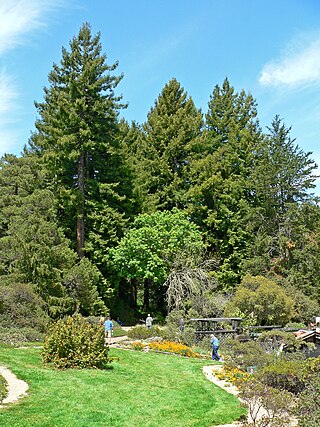
The Regional Parks Botanic Garden is a 10-acre botanical garden located in Tilden Regional Park in the Berkeley Hills, east of Berkeley, California, in the United States. It showcases California native plants, and is open to the public in daylight hours every day of the year except New Year's Day, Thanksgiving, and Christmas. The Garden was founded on January 1, 1940.

Helianthemum, known as rock rose, sunrose, rushrose, or frostweed, is a genus of about 110 species of flowering plants in the family Cistaceae. They are widely distributed throughout the Northern Hemisphere, especially in the Mediterranean.

Overland Park Arboretum and Botanical Gardens is an arboretum and botanical garden that was opened in 1991. It is located a mile west of U.S. Highway 69 on 179th Street, Overland Park, Kansas. It is operated by the City of Overland Park, Kansas, a city in the greater Kansas City metropolitan area.
Sehome, also called Sehome Hill, is a forested hill in Bellingham, Washington. The Sehome Hill Arboretum is an 175.5-acre (71.0-hectare) park of second growth forest is located on the hill, adjacent to the campus of Western Washington University. Though called an arboretum, the hilly expanse atop Sehome is not consciously planted as an exhibit of tree species, but naturally wooded and rich in the plant species typical of the region. The arboretum is jointly managed by both the university and the city. Its care is overseen by the Sehome Arboretum Board of Governors, composed of city employees, university employees, university students, and city residents. The park offers students and city dwellers over 5 miles (8 km) of public trails for walking and running and, in some areas, bicycling. Unique features of the park include an 80-foot (24 m) wooden observation tower atop Sehome, with aerial views of Bellingham Bay to the south. There is also a large tunnel, hand cut into rock in 1923, originally used for car traffic in the early 1900s. Its tall, thin shape shows its creation for cars like Model T Fords of the day. Cars are no longer allowed in the tunnel and it is part of a trail along which hikers can walk.

The Mount Pisgah Arboretum is a non-profit arboretum and botanical garden located within the Howard Buford Recreation Area, between the Coast Fork of the Willamette River and the slopes of Mount Pisgah near Eugene-Springfield, Oregon, United States.
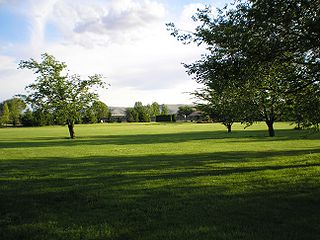
The Yakima Area Arboretum is an arboretum in Yakima, Washington on a site adjoining the riparian habitat of the Yakima River.

The University of Michigan Matthaei Botanical Gardens includes botanical gardens, natural areas with trails, and several research-quality habitats and is part of the organization Matthaei Botanical Gardens and Nichols Arboretum. The conservatory is popular year round. The public entrance is at 1800 North Dixboro Road in Ann Arbor, Michigan. The grounds are open every day, but trails are not maintained in the winter. The conservatory, garden store, and lobby are open 7 days a week. The building complex is only closed on three holidays a year.

Nichols Arboretum, locally known as the Arb, is an arboretum operated by the Matthaei Botanical Gardens and Nichols Arboretum (MBGNA) at the University of Michigan. Located on the eastern edge of its Central Campus at 1610 Washington Heights in Ann Arbor, Michigan, the Arboretum is a mosaic of University and City properties operated as one unit. The arboretum is open daily from sunrise to sunset with no charge for admission. The Huron River separates a northern section of the arboretum's floodplain woods; the railroad marks the northern border.

The Cora Hartshorn Arboretum and Bird Sanctuary, also known as the Hartshorn Arboretum, is an arboretum and bird sanctuary located at 324 Forest Drive South, in the Short Hills section of Millburn, in Essex County, New Jersey, United States. Its trails are open to the public from dawn to dusk without charge. Various programs are also offered for children, families, and adults.

Dunsmuir City Park and Botanical Gardens is a 10-acre municipal park and botanical garden maintained by Dunsmuir Botanical Gardens Inc., a non-profit 501(c)(3)organization of volunteers within Dunsmuir City Park in the city of Dunsmuir, California near Mount Shasta. The Gardens are on City of Dunsmuir property under the general control of Siskiyou County via the Board of Directors of the Dunsmuir Park & Recreation District.
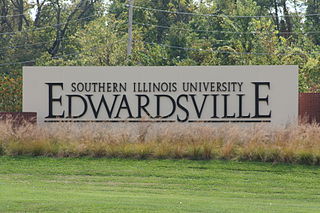
The Gardens at SIUE is a botanical garden on the campus of Southern Illinois University Edwardsville (SIUE). It originated as an arboretum and occupies a 35 acres (14 ha) tract of the university's 2,660 acres (1,080 ha) campus at Edwardsville, Illinois. It serves as a twofold function as a living laboratory dedicated in support of the educational and research missions of the university and as a place of beauty for the university community to share with the general public. In light of this duality, the gardens' master plan calls for the creation of a "public garden featuring spectacular horticulture, event spaces, areas for social gatherings and contemplative gardens" to be continuously enhanced over the coming years. The Gardens at SIUE was recognized by the Missouri Botanical Gardens as a "Signature Garden" until the MOBOT program was discontinued.




















